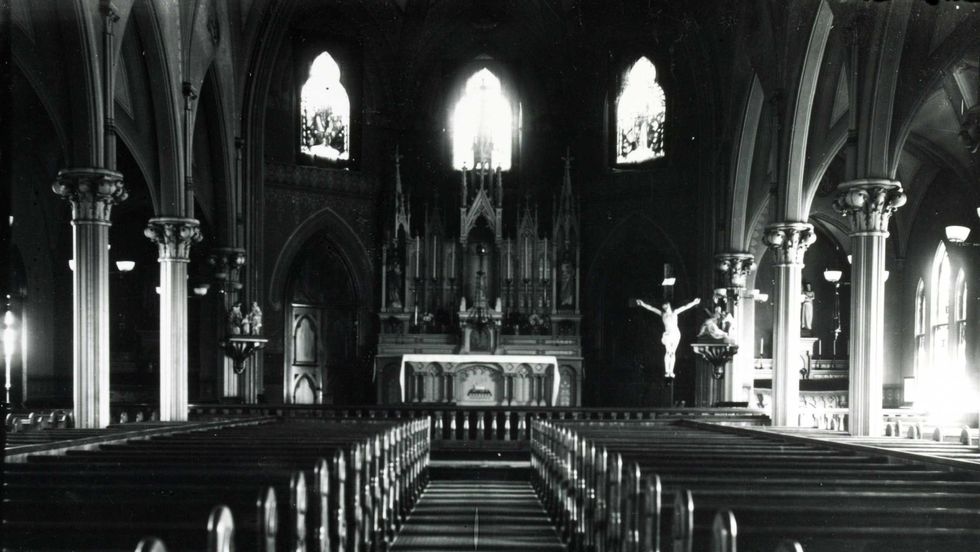The carpeted floors soften her footsteps as she slides into the church pew, and bows her head in reverence. It is broad daylight outside, but the church remains dark, save for the rays of sunlight shining through the stained glass windows, casting cracked rainbow lights on the plain floor. Reds dance with blues forming violets—a striking contrast to the eeriness of the empty church. She gazes up at the cross. The sharp, crisp lines of the woodwork distract her from the torture and pain the cross represents—but only for a moment. The way it hangs imposingly is a constant reminder to the members of the church—a warning to follow the Holy Scriptures, lest they burn in Hell for eternity.
She breathes out a puff of cold air, and crosses her arms to keep warm. How different the church feels, compared to the way Christians preach of Jesus’s warm and open arms. Pockets of darkness are tucked into the corners of the church, and if she closes her eyes, she can envision the fallen angels of Lucifer, waiting for revenge in the dark against the God who cast them out of Heaven. Their menacing black, webbed wings stretch behind them, and their eyes shine like that of a black cat in an alleyway. She opens her eyes to see murals of the archangels, Gabriel and Michael, painted on the glass windows, almost daring the demons to come out of their cowardice. With their big stature and white robe, they stand proudly—boasting that they are the angels of God—protectors of the church.
As she walks down the church aisle, the smell of sour wine and yeast permeates her lungs. The wine, representing the blood of the savior, fills her heart with a heaviness. How much blood did it take, until he slipped into oblivion, and into the hands of God? Did his blood flow freely as the Nile River, or did it slowly drip like the morning rain? She cannot feel the reverence people once held for Communion. The depression and helplessness from the world overpower the people’s desire to worship. All she can feel is emptiness. The air that envelops her is not warm or comforting—it is made of bones and sticks, poking into her flesh, tormenting her to get out.
The chants of the believers swirl in her ears. They pray to God with desperation and anguish, but their prayers go unheard, and fall on deaf ears. Every Sunday, the prayers grow weaker and weaker, until all she can hear is a small whisper. A strong difference to the reverend’s booming voice that assaults her ears. He preaches of love and forgiveness, yet when he steps off the lectern, he leads a life of deception and hate. Amen, amen, amen his followers still say. They have long forgotten the meaning of amen, but because they are good Christians, the word amen continues to fall from their lips, piling up on the ground. The original Hebrew meaning of “certainly,” an affirmation of faith, has morphed to that of a listless declaration—void of conviction. The majority are not eager to listen to the word of God, but the guilt that sloshes in their hearts, forces them to wake up on Sunday morning to shuffle into the church. The hymnals sung on Sundays are bleak and lifeless. The angels cannot be heard in the church anymore. All she can hear is the cackle of the fallen that rejoice in the church's demise.
Filth and cobwebs flood the church. Bibles are left untouched, and tucked behind the seats. The sun peeking through only highlights the overabundance of dust. The dust sways to and fro, settling lightly on any surface it can find. As she observes the cobwebs hanging from the high ceiling, she is reminded of the time when people would serve the church, making sure that it was always in impeccable condition. Now, it seems that they cannot get out fast enough, fervent to settle back into their life of sin and turmoil. How strange that I have only noticed these things now.
Finally, she treads out of the church, satisfying the voices that urge her to leave. She turns around once more to look upon the cross, and hears the wretched sobs of the One they used to worship in this place.
















